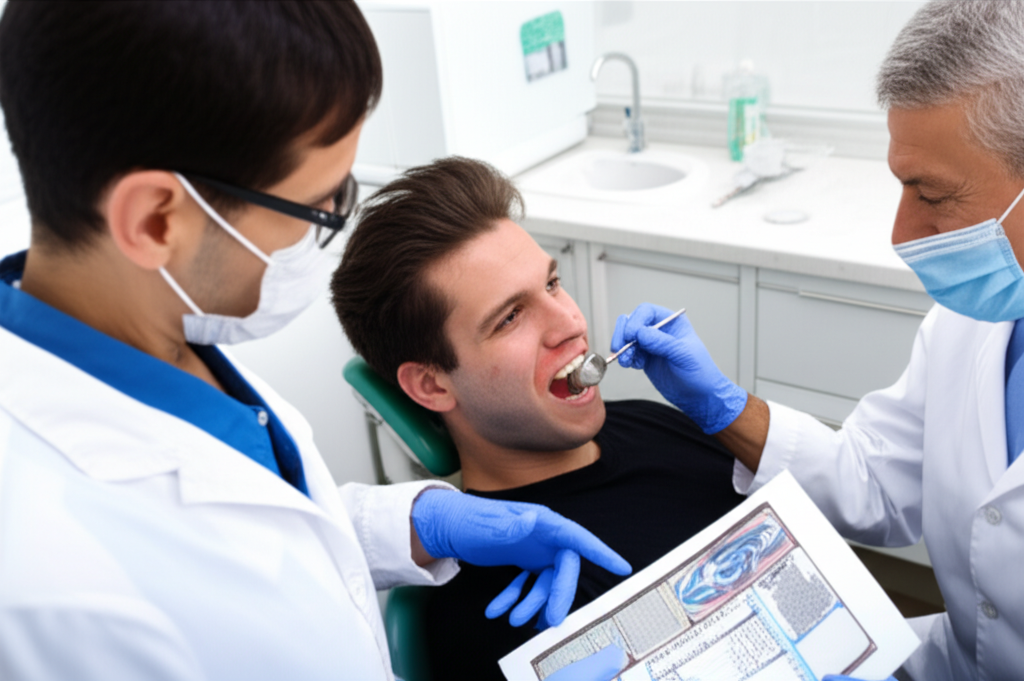
What is an Associate Dentist? Your Easy Guide to This Important Job in Dentistry
Have you ever sat in a dentist’s chair and met the “associate dentist”? Maybe you just finished dental school, or you’re a patient curious about who is helping take care of your teeth. No matter why you’re here, you’re not alone—lots of people wonder what an associate dentist does.
Let’s make it all easier to understand, with simple examples and stories. By the end, you’ll know what an associate dentist does, why their job matters, and if it could be the right path for you or someone you know.
In This Article
- What is an Associate Dentist?
- Role and Responsibilities of an Associate Dentist
- The Career Path: Associate Dentists and What’s Next
- Salary and Contracts for Associate Dentists
- Where Associate Dentists Work
- Good and Bad Sides of Being an Associate Dentist
- Must-Have Skills and Qualifications
- Is Being an Associate Dentist for You?
What is an Associate Dentist?
Let’s start with the basic question: what is an “associate dentist”?
An associate dentist is a licensed dentist who works at a dental office, but doesn’t own the office. They work for the dentist who owns the place (called the owner or principal) and treat patients, but don’t have to worry about things like business costs, hiring staff, or advertising.
You could think of them like an important team player—they help see more patients and keep everyone healthy, but don’t deal with the business side every day.
Why Is This Job Important?
A dental office can’t get everything done with only one dentist. Associates help serve more people, sometimes bring in new ideas, and can give new graduates a good place to learn and get used to their new job.
No matter if you want to work as a dentist or just want to know who’s looking after your teeth, knowing what an associate dentist does is helpful.
Role and Responsibilities of an Associate Dentist
A. What Is an Associate Dentist, Really?
An associate dentist is a dentist who works in another dentist’s practice. They are in charge of their patient care and decisions, even though they don’t run the business.
Some are employees, and some are independent contractors. But their main focus is looking after patients—not running the business.
How is this different from an owner dentist?
If the dental office was a restaurant, the owner is like the chef who also owns the place, while the associate dentist is a cook who makes great food but doesn’t have to manage the restaurant.
B. What Does an Associate Dentist Do Every Day?
Here’s what an associate dentist usually does:
- Figure out what’s wrong with teeth: Doing check-ups, what needs fixing, and making treatment plans.
- Fix teeth and clean mouths: Doing fillings, cleanings, root canals, pulling teeth, crowns, bridges, and maybe some easy braces or small surgeries.
- Talk to patients: Explaining what will happen, teaching good tooth care, listening, and answering questions in an easy way.
- Work with the team: Dentists need helpers! That means working with assistants, hygienists, and people at the front desk.
- Write things down: Keeping clear, correct notes about what happened with patients.
- Follow the rules: Always working safely, cleaning things well, and keeping patient info private and safe.
> A short story from a real office:
> Dr. Ben Carter, an associate at a busy practice, says his day is “fixing teeth, teaching people, and helping his team.” He starts with a check-up, then does fillings, crowns, and talks to patients about their treatment. At the end of the day, he’s helped many people smile, learned something new, and helped his team too.
C. How Are Associate and Owner Dentists Different?
Both can do the same dental work, but the owner runs the office while the associate mostly just works with patients.
The associate:
- Spends almost all their time on patient care and tooth treatments.
- Doesn’t worry about hiring, bills, supplies, or advertising.
- Does not own the office and doesn’t get money from profits.
The owner:
- Is responsible for the business: hiring, paying bills, buying supplies, and all the office decisions.
- Often still treats patients, but also handles extra problems and paperwork.
For the associate, this usually means less stress about money or business, and more focus on helping patients.
The Career Path: Associate Dentists and What’s Next
Is being an associate dentist just your first job, or can it be a career? That’s something many dental students ask.
A. The Usual First Job for Dental Graduates
After dental school, most new dentists start as associates.
Why?
- It’s a good, safe place to learn on the job.
- They get advice and help from more experienced dentists.
- They can get better and faster while still having backup if needed.
Almost 75-80% of new dental graduates start out as associates.
B. Growing as an Associate
Associate dentists see all kinds of patients and learn new things every day.
They get to:
- See many different ways to fix teeth and new methods.
- Get better and faster at treatments.
- Get feedback—something that’s missing if you are the only dentist in your own office.
All this helps them get ready for owning an office, teaching, or specializing later.
C. Moving Up: To Partner or Owner
For a lot of dentists, being an associate is just the first step.
Options include:
- Becoming a partner: After a few years, the owner might let you buy part of the office and share in profits.
- Buying an office: You can buy a different practice and become your own boss, with the help of outside resources like a dental ceramics lab if needed.
- Specializing: Go back to school or train to become a specialist (like an orthodontist).
How long does it take?
Most people work 3–7 years as an associate before thinking about buying or running an office. The biggest hurdles are saving up money, finding a place, and sometimes, dealing with student loans.
D. Staying an Associate
Not everyone wants to own their own office, and that’s okay.
Some people like being an associate because:
- They know their schedule.
- They want more free time.
- They only want to worry about patient care.
- They might want to move or change jobs more easily.
So, being an associate can be a life-long happy career, not just a starting point.
Salary and Contracts for Associate Dentists
Let’s talk about pay, contracts, and things you should check before you start a job.
A. How Associates Get Paid
There are a few ways associate dentists earn money:
- By production: They get a percent (about 28–35%) of what they bring in by doing dental work.
- By collections: Like production, but the percent is based on money the office actually gets paid, which can sometimes be less if payments are slow.
- By salary or daily pay: Some places, especially bigger clinics or public health clinics, just pay a set amount.
- Mix of both: Some jobs pay a set amount plus a bonus for work done.
If you’re a new associate, make sure to ask for simple, real numbers before you sign a contract.
B. What’s In an Associate Contract?
Most contracts include:
1. Pay:
How much, what for, and when you’ll get paid.
2. Work schedule:
Days, hours, evenings, and weekends you’ll be expected to work.
3. Malpractice insurance:
Will the office pay for your insurance or do you have to?
4. Benefits:
Is health insurance, time off, or money for more training included?
5. Non-compete rules:
Many contracts say you can’t work at another dental office nearby for some time if you leave. This can really affect your next job.
6. Support for more learning:
Some offices pay or offer time off for courses and training.
7. How the job ends:
How long is the contract, and what happens if either side wants to stop?
> A tip:
> Always let a lawyer who knows dental jobs look over your contract, especially if there are non-compete rules. These can keep you from working close by for years.
Where Associate Dentists Work
What kind of places do associate dentists work in? Here’s a quick look.
A. Private Practice
The classic dentist’s office—a few dentists and their team, often with a family feel.
- Atmosphere: Small and friendly teams, close to the community.
- Mentorship: Good chance for help and advice.
- Advancement: Often the easiest place to grow into a partner or owner.
B. Corporate Offices (Dental Support Organizations / DSOs)
These are chains of clinics with the same owner.
- Perks: Lots of patients, good benefits, some clear paths to bigger roles.
- Work life: More rules, less say in how things are done.
- Best for: New dentists who want steady work and structure.
C. Public Health Clinics
These clinics treat people who might not be able to pay much or have special needs.
- Pay: Usually fixed salary, sometimes with loan help.
- Challenges: Patients may have harder or more serious problems. Resources may be tight.
- Purpose: Great for people who want to help everyone get good dental care.
D. Specialty Offices
Besides general dentists, there are specialists—like folks who do only braces or children’s teeth.
- Experience: General dentists may work in specialty offices too, learning about new areas.
- Growth: Good way to get ready for a specialty.
Did you know?
New technology—like what’s offered by a digital dental lab—is making life easier for all kinds of dental offices, both for general and specialist jobs.
Good and Bad Sides of Being an Associate Dentist
No job is all good or all bad. Here’s what most people like and don’t like about being an associate.
A. Good Sides
- Less risk: You don’t pay for staff, rent, or supplies.
- Focus on care: More time to actually help patients.
- Mentorship: Help and advice from more experienced dentists.
- Work-life balance: Easier to set time off; less “worry” after work.
- Try new places: Easier to switch jobs or locations before settling down.
- Get paid sooner: You can earn money right after getting your license.
B. Bad Sides
- Not as much control: The owner usually picks materials, sets the schedule, and runs the office.
- No share in profits: Unless you buy in later, you don’t own part of the business.
- Need patients: Your paycheck depends on how many patients the office gets.
- Non-compete rules: Contracts may block you from working in the same town if you leave.
- Less say in decisions: You can’t pick staff, hours, or equipment.
In short:
If you just want to help people with their teeth and not worry about business, being an associate may be perfect. If you want control and ownership, you might prefer running your own office someday.
Must-Have Skills and Qualifications
Being a good associate dentist takes more than just a degree. Here’s what you really need.
A. Dental Skills
- Finding problems: Checking and making plans for each patient.
- Fixing teeth: Doing everything from small fillings to working with labs, like a crown and bridge lab, for more complex repairs.
- Learning on the job: Doing regular courses and training to keep up.
B. People Skills
- Good talker: Explain things simply and listen to patient worries.
- Caring: Be kind and make patients feel comfortable.
- Team player: Work well with assistants, hygienists, and the rest of the team.
- Flexible: Every place and every patient is different.
C. Schooling and License
- Dental degree: DDS or DMD from a proper dental school.
- State license: Pass the exams for the state you want to work in.
- Keep learning: Most states ask for courses every year or two.
Is Being an Associate Dentist for You?
Let’s wrap up with easy tips on what to do next.
Main Things to Remember
- An associate dentist is a dentist who works at a practice they don’t own.
- It’s where most dental grads start, giving them a safe place to learn.
- Pay can be tricky—make sure you understand how you’ll get paid and what’s in your contract.
- You can work in small family offices, big clinics, public health, or specialist centers.
- Being an associate lets you focus on teeth, not bills. If you want to own an office someday, it’s a great first step.
- Key skills: dental know-how, good talking and caring, teamwork, and wanting to learn.
What Now?
- New grads or students: Visit offices, talk to working associates, and get a feel for the job.
- Dentists thinking of a switch: Figure out what matters most to you: freedom, mentorship, or growth.
- Practice owners: Know what new dentists want—make your job offers clear and fair.
- Patients: Don’t be shy—ask who’s caring for you and what their background is.
Oral health is always a team job. Whether you see an owner or an associate, what matters is that they care about your health. Ask questions and look for offices that use the best and newest tools—like digital dentistry, strong implant dental lab support, or the best new methods from a modern china dental lab.
If you want a dental career or just want great care, learning more helps you make better choices. That’s something to smile about.
References:
- American Dental Association (ADA).
- U.S. Bureau of Labor Statistics (BLS).
- American Dental Education Association (ADEA).
- Dental Economics, Dental Practice Surveys.
This article is for learning only and isn’t a replacement for advice from a real dentist or career coach. For personal mouth care or career questions, talk to a professional you trust.








